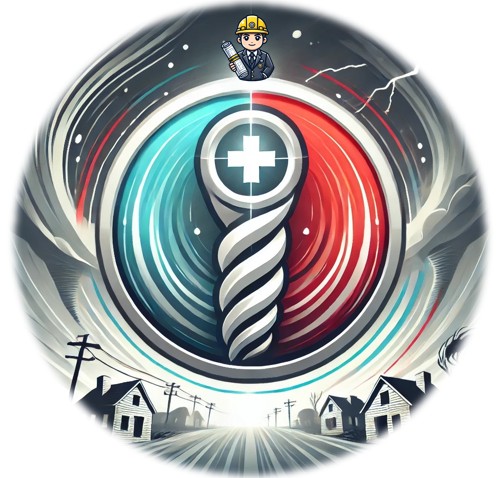𝑷𝑹𝑬𝑷𝑨𝑹𝑰𝑵𝑮 𝒀𝑶𝑼𝑹 𝑯𝑶𝑴𝑬
Leave your faucets on a slow drip.
- To help prevent frozen pipes, run a spaghetti-thin trickle of water from the faucet farthest from your water meter when temperatures approach 32 degrees.
- Run just a thin trickle to prevent contributing to a citywide water pressure drop.
- Open cabinet doors hiding pipes under sinks to let home heat reach them and prevent freezing.
- For pipes in unheated areas, use heat tape or other insulation to keep them warm.
Be prepared to turn off your water (or disconnect hoses).
- Disconnect outdoor hoses.
- Know where the main water shutoff to your property is in case of a pipe break.
- Watch for leaks as temperatures climb and ice thaws.
Turn up the thermostat.
- Leave the heat on at all times during extreme cold weather.
- Use a programmable thermostat to set different temperatures while home, at work, or asleep.
- Set the thermostat at a comfortable temperature (recommended: 60 degrees).
If a pipe bursts:
- Turn off your water and drain the plumbing.
- Locate the main water line from your meter and turn it off.
- Run all faucets to drain the pipes.
- Disconnect garden and washing machine hoses.
- Call a plumber immediately.
𝑷𝑹𝑬𝑷𝑨𝑹𝑰𝑵𝑮 𝒀𝑶𝑼𝑹 𝑷𝑬𝑻𝑺
If it’s too cold for you, it’s too cold for your pets.
- Bring pets indoors from the cold.
- If unable to bring them inside, provide shelter that protects from wind and rain, and ensure access to clean, unfrozen water.
- Prolonged exposure can lead to hypothermia, frostbite, or even death.
Stray animals seek warmth wherever possible.
- Outdoor cats often crawl into car engines for warmth.
- Before starting your car, honk the horn or tap the hood to scare them away.
- Let outdoor cats into garages or provide shelters with blankets or hay.
𝑷𝑹𝑬𝑷𝑨𝑹𝑰𝑵𝑮 𝒀𝑶𝑼𝑹 𝑷𝑳𝑨𝑵𝑻𝑺
- Cover vegetable, tender, and tropical plants with light-colored material (e.g., a bedsheet) extending to the ground without touching foliage.
- Cover citrus plants when temperatures remain below 32°F for more than 6 hours.
- Put covers on in the afternoon to trap warm air and remove or vent them during sunny or warm days.
- Water soil around plants thoroughly.
- Spread a 4-6 inch layer of mulch around the base of tropical plants.
- Bring non-hardy potted plants indoors (e.g., garage or shed).
𝑷𝑹𝑨𝑪𝑻𝑰𝑪𝑬 𝑭𝑰𝑹𝑬 𝑺𝑨𝑭𝑬𝑻𝒀
Space heaters:
- Never leave them unattended.
- Plug heaters directly into the wall socket, not into extension cords.
- Check cords for fraying or splitting and replace as needed.
- Keep anything flammable at least 3 feet away.
- Unplug heaters when not in use.
Generators:
- Use only in well-ventilated areas outside.
- Place them away from doors, windows, and vents.
- Never refuel while running; turn off and cool down first.
- Use heavy-duty, outdoor-rated cords for appliances.
- Have a qualified electrician install a transfer switch for house wiring.
Fireplaces and woodstoves:
- Use only seasoned wood.
- Ensure the chimney flue is open before use.
- Use a protective screen.
- Clean hearths and chimneys annually.
Candles:
- Use non-tip holders and keep away from combustibles.
- Extinguish before leaving or sleeping.
𝑯𝑬𝑨𝑻𝑰𝑵𝑮 𝑺𝑶𝑼𝑹𝑪𝑬𝑺
- Have heating systems inspected annually by professionals.
- Ensure proper ventilation for gas heating sources to prevent carbon monoxide buildup.
- Never use stoves or ovens for heating.
- Open a window slightly for fresh air when using gas heating in tightly sealed houses.
Smoke alarms:
- Install alarms in every bedroom, hallway, and floor.
- Test batteries monthly and keep away from vents.
Carbon monoxide detectors:
- Place near bedrooms and heat sources.
- Test weekly and clean vents regularly.

Responses